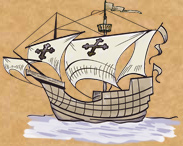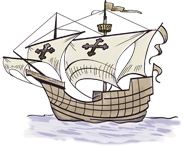A legend is a story handed down for years. It may or may not be true but is often thought believable. This legend is said to have come from a diary written by Christopher Columbus’s youngest brother, Diego.
In the year 1492, Christopher Columbus sailed from Spain with three ships: the Pinta, the Nina, and the Santa Maria. However, the Santa Maria never returned. In fact, it never reached America. It was wrecked on a reef near the country that is now called Haiti. Columbus was very saddened by the tragedy, because the Santa Maria was his largest ship. But all was not lost. The local Indian chief on the island helped save the ship’s cargo. He seemed so friendly that Columbus decided to build a fort and leave forty of his men to search for gold on the island.
But which forty men would Columbus leave behind? He knew many of his men could not be trusted. Several had turned against him and wanted to mutiny after just three weeks at sea. So he chose forty men from those he least trusted. However, there was one more problem. He had to find someone he could trust to command the forty untrustworthy men, someone who would follow his orders and protect any gold that might be found.
The only crew members Columbus trusted were his two brothers, Bartholomew and Diego. He called Diego into his quarters and asked him if he could find one honest and trustworthy crewman, someone who could be left in command of the fort. Diego said, “I don’t think we can trust anyone other than our captains and ourselves. Besides, how can you tell if the man I find is trustworthy?”
Columbus replied, “Find him, and I will put him to a test.”
Diego, with the help of Columbus’s missionary, asked questions of each of the men. After several days and much effort, they were pleased to find two men they thought might be trustworthy. Diego brought them to Columbus’s quarters and was anxious to see how he would judge their honesty. But neither man was told why Columbus wanted to see him.
Diego stood nearby as Columbus greeted both of them and said, “I will choose one of you to be commander of the fort in my absence. However, the one I choose must know how to follow my orders. Is that understood?”
Both men were taken by surprise at such an offer but replied, “Yes, sir.”
Columbus ordered one of the men to step outside while he questioned the other.
He then removed a large bullwhip from the wall, handed it to the man, and said, “I will now give you my first order. Take this bullwhip outside and give the man who just left this room ten lashes with the whip.”
The man replied, “Yes, sir.” He took the bullwhip and started to leave the room, but before he opened the door, Columbus shouted, “Halt! Give me the whip. I can see how well you follow orders. Now you may leave. As you do, send the other man in to see me.”
The second man entered. Columbus reached for the bullwhip and handed it to him. “I will now give you my first order,” he said. “Take this bullwhip outside and give the man who just left my quarters ten lashes with the whip.”
The man seemed puzzled at the order. He then asked, “Sir, what has the man done to deserve such punishment?”
Columbus replied, “Don’t question my order. Do as I command.”
The man responded, “But, sir, with all due respect, I cannot do something that I know is wrong and unjust.”
Columbus sharply replied, “Leave here at once. I will attend to you later.”
After the man left, Columbus turned to his brother Diego and asked, “Well, Diego, which one would you select to command the fort?”
Diego replied, “The first man, of course. He did not question your order and was ready to carry out your command.”
Columbus smiled and then said quietly, “No, Diego. He is not the man to be trusted. He is a man who would sell his family and friends for his own gain and ambition. The second man has what is called character, Diego, and would not sell his honor at any price, even for the rank of commander. He is the man I can trust.”
After hearing this legend, many admirals, generals, and presidents have used the “Test of Columbus” to choose trustworthy people for the important posts under their command.



